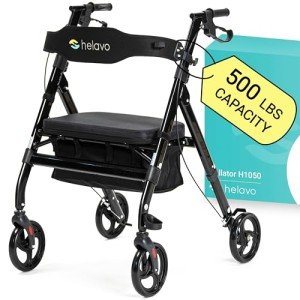A Proactive Rant About Durable Walker
페이지 정보

본문
Choosing a Durable Walker: Your Guide to Enhanced Mobility and Independence
Navigating life's daily obstacles can end up being progressively tough as we age or face health concerns that limit mobility. For many, a durable walker can be a game-changer-- offering not just physical support however also boosting confidence. This post will check out the different types of durable walkers readily available, their essential features, maintenance pointers, and how to pick the ideal Non-Slip Walker for your requirements.
What is a Durable Walker?
A durable walker is a mobility aid created to offer stability and support for people with limited movement abilities. Unlike standard walkers, durable walkers are built with robust products and engineering developed for regular use, making them ideal for users who require a reliable aid for everyday activities.

Types of Durable Walkers
When choosing a durable walker, it's important to comprehend the various types available. Below is a table detailing typical kinds of durable walkers, their features, and perfect usage cases.
| Type of Walker | Features | Perfect For |
|---|---|---|
| Requirement Walker | Lightweight, non-wheeled design, adjustable height | People requiring standard support |
| Wheeled Walker | Two front wheels, braking system | Users needing extra mobility in the home |
| Heavy-Duty Walker | Tough frame for much heavier weight capacity | Overweight individuals or those with higher mobility requires |
| Rollator Walker | Four wheels, seat, hand brakes | Users searching for resting choices during strolls |
| Folding Walker | Retractable design for easy transport | Individuals who take a trip frequently or have limited storage |
| Knee Walker | Knee support for non-weight-bearing legs | People recuperating from foot or ankle injuries |
Key Features to Consider
When choosing a durable walker, numerous features must be considered to ensure it meets your specific needs. Below is a list of necessary features:
- Weight Capacity: Ensure the All-Terrain Walker can support the user's weight securely.
- Height Adjustability: Look for walkers with adjustable heights to supply correct ergonomic support.
- Product: Aluminum walkers are lightweight and strong, while steel walkers use included sturdiness.
- Wheels: Consider walkers with wheels for simpler maneuverability if the user is mobile enough.
- Grip Handles: Ergonomically created grip handles enhance convenience and stability.
- Storage Options: Many walkers included connected seats or storage bags for convenience.
- Braking System: Essential for wheeled walkers to ensure stability throughout use.
Benefits of Using a Durable Walker
Buying a durable walker features various advantages. Here are a few:
- Increased Stability: The primary function of a walker is to supply support and stability.
- Increased Confidence: Using a walker can assist users feel more secure in moving around their environment.
- Boosted Mobility: Walkers can help people maintain mobility and self-reliance.
- Decreased Fatigue: A Bariatric Walker minimizes tension on joints and muscles throughout movement.
- Enhanced Posture: They frequently promote better posture and positioning, which can decrease neck and back pain.
How to Maintain Your Durable Walker
To make sure the durability and safety of a durable walker, regular upkeep is important. Here are some ideas:
- Check for Damage: Inspect for any fractures or loose parts regularly.
- Tidy Regularly: Wipe down deals with and frame with a mild cleaner to keep it hygienic.
- Oil Wheels: For wheeled walkers, use lube to prevent squeaking and guarantee smooth motion.
- Height Adjustments: Periodically check if the height is still suitable and adjust appropriately.
- Tighten up Screws: Regularly inspect screws and bolts to ensure they are tight and secure.
Often Asked Questions (FAQs)
1. How do I know which type of walker is best for me?
Picking the best walker depends upon your specific mobility requirements, weight capability, and convenience choices. Consulting with a health care professional can offer customized insights.
2. Can I use a walker on irregular surface areas?
While numerous resilience walkers are designed for numerous surfaces, it's a good idea to utilize them on flat surfaces when possible. Look for walkers with larger wheels for better performance on irregular surface areas.
3. Are there walker's covered by insurance coverage?
In most cases, Medicare and other insurance coverage plans cover durable walkers with a healthcare service provider's prescription. Examine with your insurer for specific information.
4. Can walkers be used outdoors?
Many durable walkers appropriate for outdoor usage. Nevertheless, selecting one with larger wheels and good suspension will enhance the experience on irregular terrains like grass or gravel.
5. How much weight can a heavy-duty walker support?
Heavy-duty walkers typically support in between 300 to 600 pounds, depending upon the model. Constantly examine the producer's requirements.
A durable Brake Walker can significantly enhance the quality of life for people with mobility obstacles. By understanding the different types, features, and upkeep standards, users can make an informed choice that best meets their requirements. With the best walker, people can gain back mobility, self-reliance, and self-confidence in their every day lives. As constantly, speaking with a health care professional for customized suggestions is motivated to make sure the very best suitable for mobility requirements.
- 이전글[성기능증진제] 레비트라 30정+레비트라 30정 ₩ 160,000 - 하나약국 정품 25.10.09
- 다음글The 15 Things Your Boss Would Like You To Know You Knew About Buying A Driving License Online 25.10.09
댓글목록
등록된 댓글이 없습니다.

